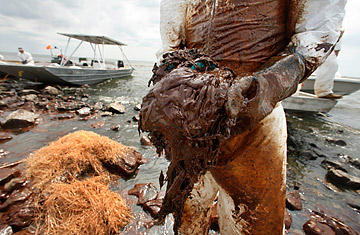
A clean-up worker picks up blobs of oil in absorbent snare on Queen Bess Island at the mouth of Barataria Bay near the Gulf of Mexico in Plaquemines Parish, La., Friday, June 4, 2010.
The marina of this Mississippi River Delta community usually teems with fishermen, oystermen and shrimpers. But the scene on Monday afternoon fell far short of that. Only a single crew could be seen filling crates with plump blue crabs freshly pulled from the bays to the east, which is among the few stretches of nearby water where oil hasn't been found. Men sat on stools outside the marina's shop, sipping cold beers in the humid air. "There's nothing else to do," says Shawn Encalade, 47, a boat welder, looking out at rows of marooned vessels.
The worst oil spill in American history is being measured in environmental and economic terms — especially given the threat it poses to Louisiana's $2.4 billion seafood industry. But the cultural toll must also be considered. The disaster may signal the end of Louisiana towns like Phoenix and Point a la Hache, which hug the Mississippi River and comprise one of the state's largest stretches of African-American fishing communities.
On Monday afternoon, Clarence Duplessis wasn't on a boat fishing. He was dressed in a dapper gray suit, testifying before a Congressional subcommittee's special session in St. Bernard Parish, a New Orleans suburb about an hour's drive north from Phoenix. "We watch our livelihood and even an entire culture being washed away by crude oil and chemicals that no one knows the long-term effects of," said Duplessis, 65.
The towns of Phoenix and Point a la Hache sit in Plaquemines Parish (as Louisiana counties are called), the state's southernmost jurisdiction, a marshy terrain carved out of where the Mississippi River empties into the Gulf of Mexico. For much of the 19th Century, the parish's life was dominated by African-Americans — slaves, as well as freed descendants of Africans, Native Americans, and French and Spanish settlers. Many of those descendants were granted land carved from the plantations that lined the river. They took to the water: fish, shrimp, oysters and crabs, all of which formed the base of the area's diet.
By the 1970s, many of the blacks had moved from sharecropping potatoes and okra to buying their own boats. They became a force in the local seafood industry. Women mostly took jobs at a local furniture factory. "For a period of time, we were doing good," recalls Byron Encalade, 56, president of the Louisiana Oysters Association, which represents about 75 local families, most of them black. (Encalade is a common surname in the small town.)
Then came Hurricane Katrina. The storm pushed more than 20 feet of water from the bay onto the towns. In Phoenix, about 22 of the 166 homes were destroyed. Much of the soil was contaminated. Many of the area's women remained in Baton Rouge and other towns where they fled after Katrina to keep their children in school. The men returned to rebuild the families' homes, and many took full-time, well-paying jobs on the Gulf of Mexico's oil rigs. Still, they worked the bayous on their days off. Nearly 50% of area residents work in the seafood industry full time.
The town of Phoenix (pop. roughly 300) has built a gleaming high school and fire station. Yet, the anxiety remains high. No one knows what will happen to the town's elderly, widowed women, who barely survive on $600 a month in disability payments. The remaining younger women are mainly out of work, now that the furniture factory has closed. The Rev. Tyrone Edwards, pastor of Zion Travelers Baptist Church, the town's largest, is concerned many residents will become depressed — and, eventually, succumb to ailments triggered by polluted oil and drinking water. So he's enlisted his wife, a registered nurse, to begin a health assessment of the town's residents. Families often make gumbos from the seafood pulled from the water. But soon, even that may be untenable.
There's no reason to believe black oystermen, fishermen and shrimpers have been excluded from BP's distribution of more than $84 million in compensatory checks. The company has sent hundreds of claims adjusters across the south to assess the damage and speed up the claims process to a matter of days. Byron Encalade, the oyster association president, was initially hesitant to enlist one of his company’s boats for the cleanup process. He feared that much of the information gleaned from the financial documents could be used against him. With the company's early compensation contracts, he says, "They wanted you go give up a lot of your rights. No way in the world I was going to do that." Eventually, those terms were relaxed. So two weeks ago he signed up one of his boats to work in the cleanup effort. He's yet to be paid the $5,000 BP has agreed to pay the captains or owners of boats. But even that won't cover the costs of fuel for his trucks — which easily tops $900 a week.
On a recent humid afternoon, Encalade carefully considered his community's future, given the unfolding crisis. "We'll never leave. That's just not in our vocabulary. We're going to stay here and fight."
